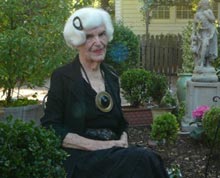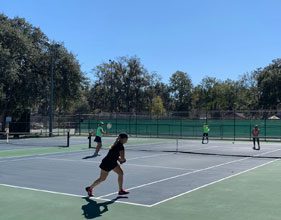 Local grassroots group seeks to improve the quality of Beaufort’s downtown tennis facilities while the area’s tennis community continues to grow.
Local grassroots group seeks to improve the quality of Beaufort’s downtown tennis facilities while the area’s tennis community continues to grow.
By Mindy Lucas
It’s a bright, crisp Sunday morning in downtown Beaufort. A group of women are playing doubles tennis at the courts on the corner of Bladen and Boundary streets.
As the players trade shots, traffic passes by on Boundary, though the women seem oblivious to the noise just a few yards away.
“Oh I missed it,” says one player as the ball flies past her.
Later the group (above) identify themselves as Katrine Patterson, Eve Fowler, Linda Evans and Barbara D’Angelo.
The four, who are on a Women’s United States Tennis Association (USTA) League, say they play about three to four times a week on the downtown courts, which are owned and maintained by the county.
They like the facility because they don’t have to pay club or HOA fees, which makes it affordable, and, since the courts are well lit, they can even play at night.
“This is a huge community asset,” says Patterson, adding that just an hour earlier, the courts were teeming with players out taking advantage of the nice weather.
To anyone passing by, it would appear that Beaufort has a thriving tennis community, and they would not be wrong about that.
In fact, Beaufort has one of the fastest growing tennis communities in the region, says Jerry Wayne, a regular himself at the downtown courts and the local league coordinator for the USTA.
“Without a doubt it is (growing),” says Wayne, who, along with his wife, Vivian Wayne, coordinates Beaufort’s USTA league, Coastal Carolina Tennis Association (CCTA), which includes Beaufort and Jasper County. Hilton Head, he explains, has its own organization.
At the end of 2018, the number of players or people who had played in the CCTA was 322. By the end of 2019, that number had jumped to 3,187 – a phenomenal number, says Wayne.
What’s more, signups to play in the league, which start over at zero every year, are already at 1,380 for 2020.
In addition to an enthusiastic group of players looking for a healthy lifestyle, part of what has helped propel Beaufort’s tennis community forward has been the county’s public courts.
“The downtown courts – that’s the jewel of tennis for Beaufort County,” says Wayne. “Because it’s in the heart of the city, and they’ve been there for long time.”
Beaufort County has approximately 17 public tennis courts spread out around the county at various parks and facilities, according to Shannon Loper, Director for Beaufort County Parks and Recreation.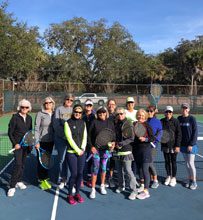
The downtown Bladen Street facility, which has seven courts, has a long history of providing great tennis play, says Jan Horan.
A competitive tennis player who also captains several teams, Horan began playing at the downtown courts about five years ago.
The decades old courts play host to a variety of matches, she says, from weeknight games to mixed doubles as well as pro exhibition matches. Up until recently they served as the venue for the Beaufort Water Festival’s annual tennis tournament.
But the condition of the courts has been deteriorating over the last few years, many of the regulars who play there say.
As Horan and a grassroots group called “Downtown Tennis” recently outlined in a presentation made to Beaufort County Council, the courts are in need of major resurfacing and repairs.
Cracked, chipped and uneven surfaces have made play difficult at times. Fencing is rusted and out of shape, equipment is broken, surfaces need to be deep-cleaned or painted and proper wind screens are needed. The courts no longer meet the standards for USTA competitive play, Horan says.
Members have also suggested that security cameras be added, better seating and shading considered, and that accessibility to the courts be improved since they have had players in wheelchairs.
Resurfacing the courts alone can be an expensive proposition, Horan admits, with each court costing approximately $25,000 to resurface, or about $175,000.
However, the USTA recently awarded the county a $60,000 grant for resurfacing the courts. The county has to first address drainage issues, however, before that work can begin.
In the meantime, the group cites the courts at Chaplin Community Park, a multipurpose recreational park owned and maintained by the Town of Hilton Head, as the gold standard for what Beaufort’s tennis courts could look like.
By comparison the park has security cameras and lighting, smooth surface parking, proper wind screens, and other amenities.
“Those are really nice,” says Horan.
“But we’re not asking for country club facilities. We’re just asking for a safe, secure, decent place to play,” she says.
Originally from Indianapolis, Horan and her two sisters grew up playing tennis on the city’s clay courts.
“That was the only place my mother would let us go,” she says, adding that the people who played there all became lifelong friends.
Since the presentation, the county has responded to many of the repairs that could be addressed immediately, Horan said recently. Restrooms have been painted, lights repaired, trees trimmed, and the county purchased cleaning and maintenance tools for players to maintain the courts.
“I think what we’ve done is, we’ve built a relationship and a communication channel with them,” she says.
Meanwhile, the downtown courts continue to attract players from a variety of demographics, from local high school tennis teams to young adults with families, adults who play after work or on the weekends, and seniors or retirees looking for a way to stay active.
“There is a growing market for this population,” Horan says. “It’s not just seniors, it’s teenagers and all ages, and it’s men, women, boys and girls.”
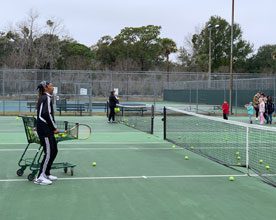 Local tennis coach and national tennis champion Larry Scheper agrees with Horan.
Local tennis coach and national tennis champion Larry Scheper agrees with Horan.
“We get all ages out here, from 2 to 80,” he says.
Something of a hometown hero, Scheper (left) coaches at Beaufort Academy and conducts a free children’s tennis clinic, with the help of local volunteers, at the courts every Saturday. He also gives private lessons.
Despite temperatures that barely rose above the mid 40s, Scheper had more than a dozen children turn out for the program on a recent Saturday. The weekend before, when the weather was nicer, the clinic saw some 30 to 35 kids.
Scheper says he has seen Beaufort’s tennis community grow and the activity on the downtown courts increase since returning to South Carolina in 2009.
“There was no tennis at all,” he says. “Out here was like a ghost town.”
Now the courts are busy a good bit of the time, though playing downtown comes with the acknowledgement that you are still playing in a city, both he and Horan say.
“People complain about the noise, but you can go to the U.S. Open or you can watch it on TV, and you can 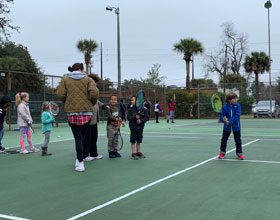 hear the planes and the sirens in the background,” he says, pausing.
hear the planes and the sirens in the background,” he says, pausing.
“But you got to remember, this is not a country club,” he says, chuckling.
Why is it important to maintain the downtown courts?
Horan says for her and others who play, tennis is synonymous with the Lowcountry lifestyle.
“It supports a healthy lifestyle,” she says. “A lot of people like to come downtown so they can play and go to restaurants while they are here. (Also) a lot of people cannot afford the private club fees or the transportation to get out to the outer islands.”
Scheper, who was inspired to start a free tennis clinic by tennis great Arthur Ashe, says tennis can have a positive influence on the lives of youth and adults alike.
Before going on to win a number of men’s singles and doubles championships, Scheper went to Grambling State University in Louisiana on a tennis scholarship.
“That’s what we’re all about – reaching out to the kids. Giving them a vehicle to maybe the future, which is college,” he says. “So now we’re giving back.”

